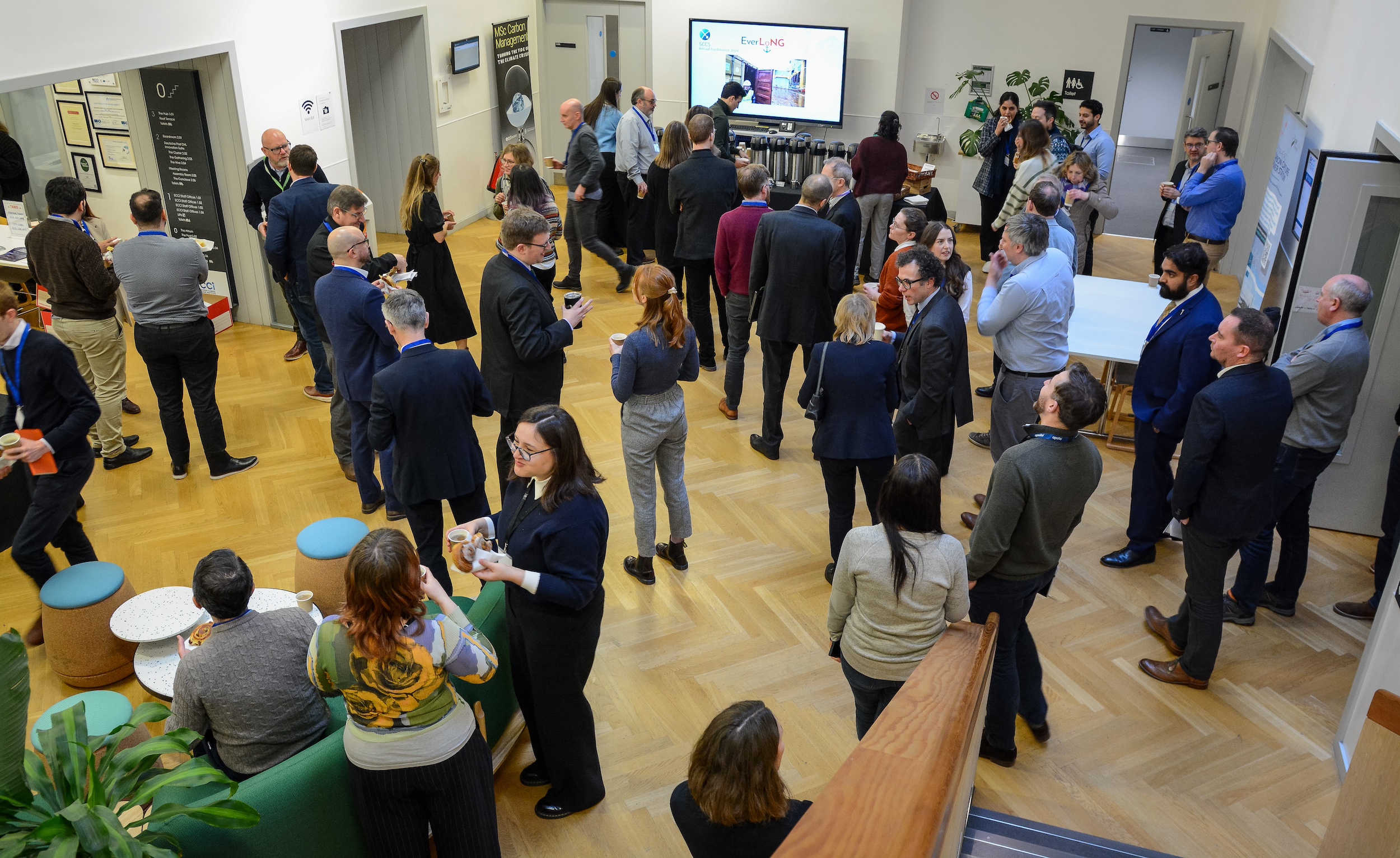On December 3rd SCCS hosted over 100 delegates plus over 50 online participants to our 2024 Annual Conference at the Edinburgh Climate Change Institute. Sector experts from government, NGOs, industry and academia presented a programme of talks on the topic “Scaling up CO2 Transport and Storage for a Decarbonised Europe”. Guests also enjoyed access to posters presenting ongoing related research across the SCCS partnership. Click here to see full event details and presentation slides
Welcoming everyone, Bryne Ngwenya, Head of the School of Geosciences at The University of Edinburgh, where the SCCS secretariat is based, highlighted that Carbon Management is a key interdisciplinary theme across multiple research and teaching areas. Bryne acknowledged SCCS’ position as a world-class collaborative research partnership and our unique and impactful role in delivering outreach, policy advice and training in CCS and related technologies.
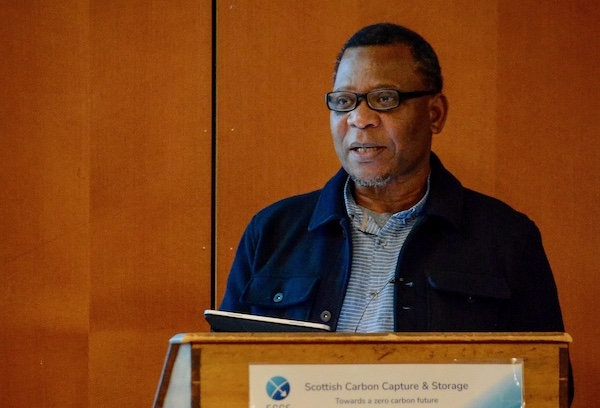
Bryne Ngwenya, Head of the School of Geosciences at The University of Edinburgh
SCCS Director, Professor Stuart Haszeldine’s opening address quoted the 2024 UN Gap report showing we have already failed to hold to 1.5 degrees of global warming and emphasised the need for urgency. While welcoming the recent Track-1 funding allocation of £21.7bn which, over the 25-year timeframe, will cost each UK citizen less than £0.25 per week, he also cautioned that there remained a risk of storage progressing too slowly. Under the key message of accelerating CCS by mandate, Stuart proposed a Carbon Takeback Obligation (CTBO), a supply-side mitigation policy measure that would see a legally binding responsibility placed upon extractors and importers of fossil fuels to capture and store the CO2 their activities and products produce.
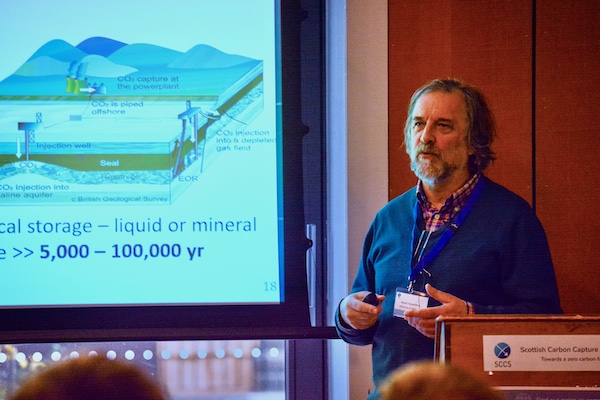
Professor Stuart Haszeldine, SCCS Director
The plenary opened with an exposé of the UK-EU policy landscape giving expert views of the status and a glimpse of future aspirations. Sharing the position of the UK’s CCS industry, Olivia Powis (CCSA) highlighted the UK’s potential storage capacity of 78 billion tonnes (100 times current annual emissions) and predicted Europe-wide benefits of UK participation in a cross-border CO2 market; a single specification standard for CO2 along with clarity on liabilities are essential to unlocking this. Andrew Russell detailed DESNZ’s business models that will provide governance, alluding to the possibility of an import/export market. Echoing Professor Haszeldine’s warning, Aymeric Amand (ZEP) shared digital countdown clocks to demonstrate the harsh reality that the EU is also on a trajectory to not meet emissions reduction targets. He pinned great hope, though, on the future application of new CCUS technologies to reduce the pace of global warming and, effectively, re-set the carbon clock on a trend that better matches ambition. With the Net Zero Industry Act (NZIA) emplaced as the first legal building block, transport is key to implementation of the EU’s three Industrial Carbon Management pathways, explained DG Clima’s Daniel Kitscha. Together with the EU Emissions Trading Scheme (ETS) these form an essential element of realising the 2040 proposed emissions reduction target. The panel concurred on the need for heterogeneous standards for different CO2 streams across EU-UK and that one of the risks of delay is an inevitable doubling of effort to remediate.
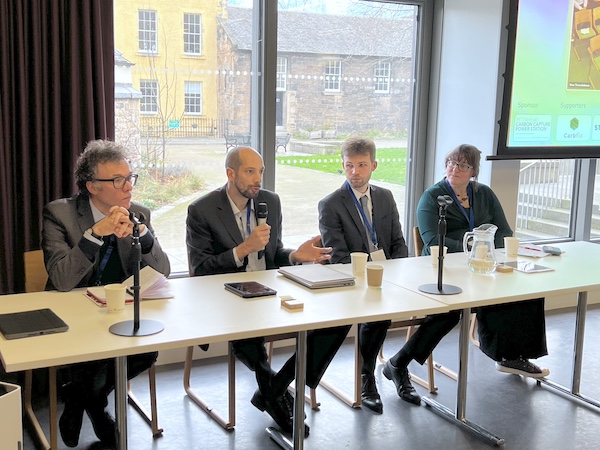
Session 1 Panel (from left): Daniel Kitscha (DG CLIMA), Andrew Russell (DESNZ), Aymeric Amand (ZEP), Rebecca Bell (CCSA)
A highlight of the day was the keynote address by Dr Alasdair Allan (MSP), Acting Minister for Climate Action, Scottish Government. Opening with acknowledgment of the Scottish Government’s position as a minority one, Dr Allan gave a strong and clear statement of the importance of CCS in meeting Scotland’s climate change goals. In Dr Allan’s words “The Scottish Government are fully supportive of CCUS; Scotland has the people, infrastructure and storage to lead domestic and international CCUS.” He laid out Scotland’s position and the essential reliance on timely Track-2 support. Dr Allan noted that realising the ambitions for using Scotland’s exceptional CCS resource needs a business model to capitalise on this opportunity, beyond development of the Acorn project alone.
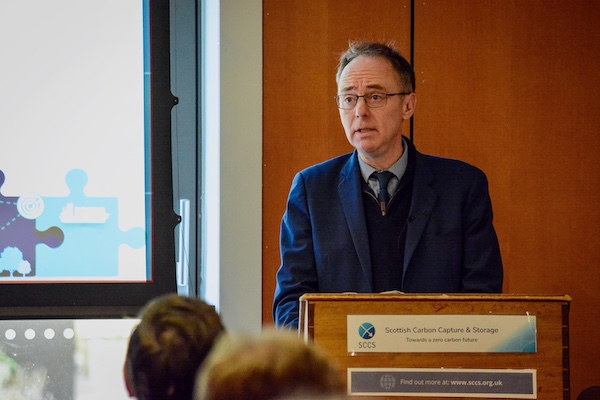
Dr Alasdair Allan (MSP), Acting Minister for Climate Action at Scottish Government
Session 2 introduced speakers from Europe-based NGOs and independent specialist companies on the broad topic of Boundaries and Borders. Toby Lockwood (Clean Air Task Force) interpreted the main issues exhibited by carbon management developments in the European Union are delays on reaching final investment decisions and having sufficient funding; echoing Daniel Kitscha, he also stressed the need for transport intelligence. Toby also saw implementation of ‘adequate penalties’, project coordination and a budget allocation to Contracts for Difference (CFD’s) as key enablers for NZIA success. For Norwegian CCS Law specialist firm IOM Law, Ingvild Ombudstvedt spoke on cross-border CCS beyond the London Protocol, following its 2019 resolution. Encouragingly, there are already 9 EEA bilateral agreements in place, with more expected, yet none, to date, with the UK. Speaking on Norway’s role in accelerating CO2 transport and storage in Europe, Irina Ålund (Carbon Limits) noted that hearings are currently being held in Norway on EEA inclusion to address a capacity shortfall in the NZIA’s storage target. Fabian Liss (Bellona) shared the status and challenges of a carbon management strategy for Germany. With apparent stalling and a lack of clarity on domestic CCS with no social licence, Fabian concluded that Germany seems unlikely to see timely progress, despite its 2045 net zero target. The panel discussion concluded that Germany’s delay in delivering its Carbon Management Strategy, combined with the reality that the EU and UK are unlikely to deliver 2030 rates, will likely result in smaller targets for 2040, and that that indicated a need for 2035 interim targets course correction.
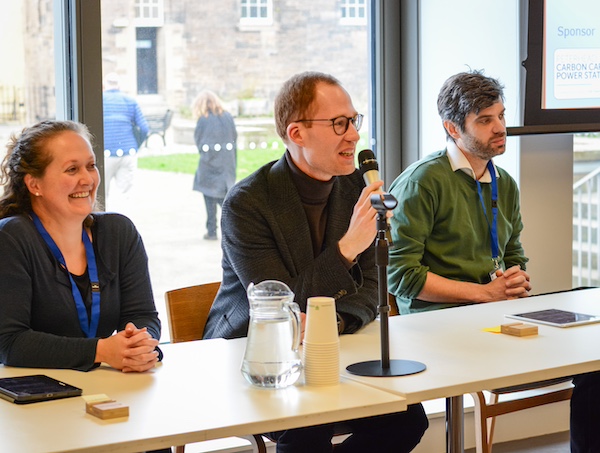
Session 2 Panel (from left): Ingvild Ombudstvedt (IOM Law), Fabian Liss (Bellona), Toby Lockwood (Clean Air Task Force)
Technical Challenges and enablers of cross-border CO2 transport and storage with examples from different disciplines and jurisdictions featured in Session 3. Denmark’s approach uses targeted government funding to support publicly available analysis of storage sites, simplifying and speeding up licensing and, simultaneously, delivering public ownership. Carsten Nielsen (GEUS) included some detailed insights into the practical approach taken in Denmark to rapidly progress significant storage volumes. Alluding to the challenges this brings in terms of asset management and development, Carsten also shared examples of successfully engaging with communities exposed to CCS operations and stressed its importance. Next, on CO2 network operation challenges, Stefan Belfroid’s (TNO) overview of simulating CO2 flow in the Porthos and Aramis CCS projects of the Netherlands demonstrated the specific challenge of managing variable phase pipelines and pressure. Reflecting comments from the first panel of the day, this work highlighted the importance of effective sharing arrangements and clarity on network specifications/penalties.
The SCCS partner institutions have a long history of CCS teaching and research, and it seemed especially fitting to welcome back The University of Edinburgh alumnus, Peter McFadzean (Equinor) to speak. Peter gave a status report on behalf of the Track-1 storage provider Northern Endurance Partnership (NEP). He confirmed NEP anticipates FID imminently* and gave a broad overview of the legal and commercial framework from the perspective of an operator. Owain Tucker (Shell) shared details of Shell’s own 20 years’ involvement in CCS and gave the audience an analogy of herding sheep into and out of a field to illustrate that, while it might be seen as superficially similar, CCS (CO2 injection) is an entirely different prospect from Oil and Gas extraction. He concluded that an effective approach manages technical, social, and financial risk as related systems that required integrated thinking, a ‘stable ask’, front-end loading, and acknowledging and developing storage based on similarities and differences. In her talk “A technical perspective on storage complexes and national boundaries”, Professor Gioia Falcone (SCCS Directorate, University of Glasgow) opened with the primacy of the CCS Directive and how this relates to understanding the risk of lateral migration. There was an important recognition that physical boundaries are manageable for a pilot project but will need to be anticipated at basin-scale. The panel Q&A was a lively discussion including the question of who drives availability of storage – storage operator or CO2 exporter? - and how technical advantage can be used in different ways.
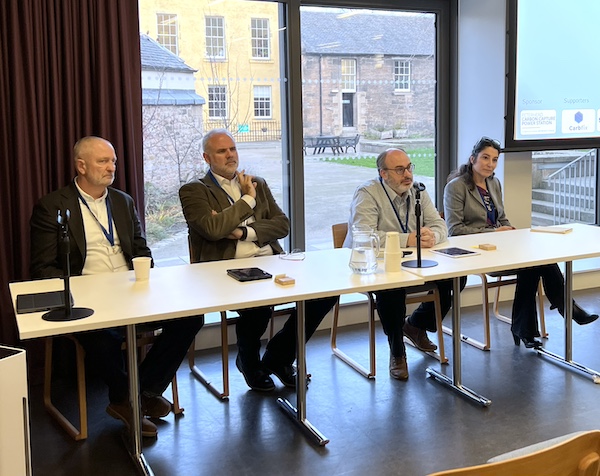
Session 3 Panel (from left): Carsten M. Nielsen (GEUS), Owain Tucker (Shell), Stefan Belfroid (TNO), Gioia Falcone (University of Glasgow)
Insights from projects and infrastructure developers combined to show that significant gains are being made towards cross-border CCS. Lead developer of Hynet, Andy Brown (Progressive Energy), illustrated the challenges resulting from CO2 stream impurities and how this will, inevitably, impact provision of a flexible EU‐wide network. Andy also acknowledged that a single impurity specification will be needed for pipelines to cross national boundaries and form an EU-wide infrastructure. Hanne Talboom (Port of Antwerp-Bruges) shared the ports’ plans for development as a CO2 hub for Europe. This involves CO2 gathering from the hinterland via train, barge and pipelines combined with export by ship and pipeline. With construction to begin before 2028, Hanne noted key challenges of changing legislation, CO2 specifications, investments to North Sea storage sites and “connecting the dots” (of all aspects). Martijn Smit (Equinor) then brought the plenary sessions to a fitting close, giving an express summary of the end-to-end delivery of the CO2 Highway Europe pipeline. Aiming to import CO2 from north Europe’s ports to storage at Northern Lights in Norway, this ambitious scheme has already learned some lessons: among them the importance of converging timelines for related projects and the overarching need to achieve a balance of technical versus commercial maturity.
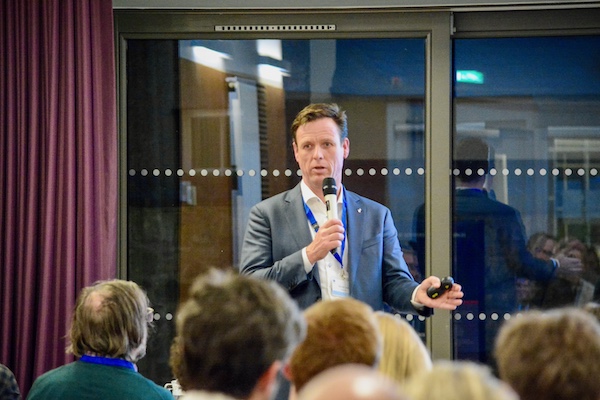
Martijn Smit, Equinor
The range of talks and topics of the day touched on many themes and facets that focused light on progressing cross-border CCS in Europe. We saw the evidence presenting the challenges facing the UK and EU in meeting net zero targets and that we seem set for a 2035 interim targets adjustment. Technology offers a key to remediate but its application needs to work with cross-border agreements, transport availability and certainty of storage. Of all the themes of the day there were two that stood out. Firstly, that funding and commercial agreements are essential to accelerating cross-border storage, but project delivery requires constant balancing and adjustment between technical and commercial readiness. Secondly, that there is a clear need for heterogeneous standards for different CO2 streams across EU-UK.
Among the speakers and delegates there was a great breadth and depth of expertise. Gillian White’s concluding remarks noted that, from Scotland’s Minister for Climate Action with a doctorate in Gaelic literature, through to lawyers, policy analysts, major infrastructure project engineers and geoscientists, representatives from governments, NGOs, industry and academia; all share a conscientious ambition for CCS. Collectively, we have the skill to enable its wide deployment. We must all play our part as progress comes through collaboration. SCCS will celebrate its 20th Anniversary in 2025, and we look forward to welcoming you then for our next conference. Save the date December 2nd!
* FID was subsequently announced for the Northern Endurance Partnership on 10 Dec 2024
Click here to view the photo gallery
Sponsors
Supporters






